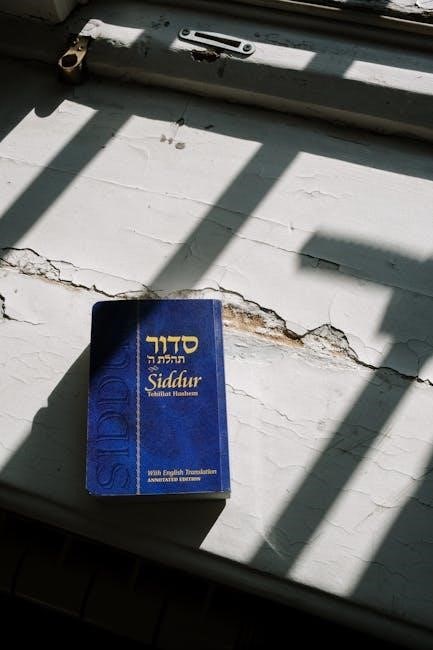jewish daily prayers pdf
Jewish daily prayers are a cornerstone of spiritual practice, offering moments of reflection and connection to tradition. Structured around morning, afternoon, and evening services, they include central prayers like Shema and Amidah, fostering mindfulness and gratitude. Accessible via PDF guides and siddurim, these prayers provide a meaningful framework for daily worship and meditation.
Overview of Jewish Daily Prayer Services
Jewish daily prayer services are structured into three main sessions: Shacharit (morning), Minchah (afternoon), and Maariv (evening). Each service includes core prayers like Shema, which declares faith, and Amidah, a silent devotion of 18 blessings. Additional elements vary by service, such as Birkot HaShachar (morning blessings) and evening reflections. These prayers foster spiritual connection and gratitude, with resources like PDF guides and siddurim providing accessible frameworks for worship. The services emphasize community and mindfulness, offering a structured way to engage with Jewish tradition throughout the day, while also accommodating personal supplications and reflections. This daily rhythm of prayer is a cornerstone of Jewish spiritual life.
Importance of Prayer in Jewish Tradition
Prayer holds a central role in Jewish tradition, serving as a bridge between the individual and the divine. It is a means of expressing gratitude, seeking guidance, and cultivating mindfulness. Daily prayers, such as Shacharit, Minchah, and Maariv, provide a structured way to connect with Jewish values and heritage. They are not just rituals but opportunities for introspection and spiritual growth. PDF guides and siddurim make these prayers accessible, ensuring that Jews worldwide can engage in this sacred practice. Through prayer, Jews affirm their faith, honor their traditions, and find strength in community and personal reflection.
Morning Prayers (Shacharit)
Shacharit begins with blessings like Modeh Ani and Baruch Sheamar, followed by Ashrei and Shema. The Amidah is central, offering silent devotion and gratitude, reflecting Jewish faith and daily renewal.
Shema: The Core of Jewish Prayer
The Shema is a foundational prayer in Judaism, recited twice daily, morning and evening, as commanded in the Torah. It declares the unity of God and the commitment to follow His commandments. The prayer consists of three biblical passages: Deuteronomy 6:4-9, Deuteronomy 11:13-21, and Numbers 15:37-41. It is a proclamation of faith and loyalty, central to Jewish identity. The Shema is often referred to as the “watchword of Judaism” and is included in the daily prayers, emphasizing the importance of loving and serving God with all one’s heart, soul, and might. It connects Jews worldwide in shared devotion and heritage.
Amidah (The Silent Devotion)
The Amidah, also known as Shemoneh Esrei (Eighteen Blessings), is a central prayer in Jewish daily worship, recited silently during morning, afternoon, and evening services. It consists of nineteen blessings on weekdays, with variations on Shabbat and holidays. The prayer begins with praise, transitions into personal and communal requests, and concludes with thanksgiving. Individuals may add silent supplications during specific sections. The Amidah is a time for personal reflection and humility, often accompanied by physical gestures like bowing. Its structure encourages a deep connection with faith and community, making it a cornerstone of Jewish prayer life.
Additional Morning Blessings and Prayers
Beyond the Shema and Amidah, Jewish morning prayers include a series of blessings and devotional readings. These begin with Modeh Ani, expressing gratitude upon waking. The service continues with Mah Tovu, a prayer for entering the synagogue, and Baruch Sheamar, praising God’s creation. Ashrei and Yishtabach follow, extolling divine mercy and presence. These prayers, often recited with joy and intention, foster a sense of reverence and readiness for the day ahead. Together, they create a holistic morning worship experience, blending gratitude, praise, and spiritual preparation, as outlined in Jewish daily prayer guides and siddurim.

Afternoon Prayers (Minchah)
Minchah, the afternoon prayer, reflects on the day’s challenges and seeks divine guidance. It includes the Amidah and, on holidays, Torah readings, fostering mindfulness and connection.
Structure of the Afternoon Service
The afternoon service, Minchah, begins with Ashrei and includes the silent Amidah prayer. Optional Torah readings occur on holidays. The service concludes with the Shema and its blessings, fostering reflection.
Key Prayers and Blessings in Minchah
Minchah includes the Amidah, a silent prayer focusing on gratitude and requests, and the Shema, affirming faith. Additional prayers like Tachanun (weekday supplications) and Torah readings (on holidays) are featured. Blessings before and after the Shema emphasize divine loyalty, while Aleinu concludes with hope for universal peace. These prayers reflect themes of reflection and connection, grounding the service in tradition and spirituality. The structure ensures a meaningful afternoon worship experience, aligned with Jewish values and practices. PDF guides and siddurim provide detailed access to these prayers, enriching the Minchah service for all participants.

Evening Prayers (Maariv)

Maariv concludes the day with reflective prayers, recited after sunset. The service includes the Shema, Amidah, and blessings, fostering gratitude and mindfulness as night begins. PDF guides provide detailed access.
Maariv Service: Evening Reflections
The Maariv service is a serene evening prayer that cultivates reflection and gratitude. Recited after sunset, it includes the Shema, Amidah, and additional blessings. These prayers, outlined in PDF guides, help transition from day to night, offering moments of introspection and connection to the divine. They emphasize appreciation for daily blessings and renewal of faith, fostering a peaceful mindset for rest. The service also includes personal reflections, encouraging individuals to express their thoughts and requests, making it a meaningful conclusion to the day.
Birkot HaShachar and Evening Blessings
Birkot HaShachar are morning blessings recited upon waking, expressing gratitude for daily renewal and divine kindness. These prayers, found in PDF guides, acknowledge the simplest yet profound aspects of life, such as sight, clothing, and freedom. Evening blessings, part of the Maariv service, reflect on the day’s experiences, seeking forgiveness and peace. They include the Shema and personal supplications, fostering introspection and closure. Together, these blessings frame the day with mindfulness and gratitude, connecting individuals to their faith and community, and are beautifully outlined in accessible Jewish prayer resources for daily observance.
Blessings and Supplications

Jewish daily prayers include blessings for gratitude, food, and life’s moments. Found in PDF guides, these prayers reflect spiritual mindfulness and connection to divine providence, enriching daily life and observance through structured devotion and heartfelt supplication.

Birkot HaShachar: Morning Blessings

Birkot HaShachar, or morning blessings, are a series of prayers recited upon waking, expressing gratitude for daily miracles. These blessings acknowledge divine providence in all aspects of life, from vision to mobility. Found in PDF guides and siddurim, they include prayers like Modeh Ani and blessings for Torah study. Their recitation fosters mindfulness and sets a positive tone for the day. Rooted in tradition, Birkot HaShachar are a cherished practice, encouraging Jews to begin each day with reflection and appreciation for life’s simple yet profound gifts, reinforcing spiritual connection and joy in everyday experiences.
Blessings Over Food and Gratitude
Blessings over food are a fundamental aspect of Jewish daily life, expressing gratitude for sustenance and divine provision. Before eating, specific blessings like Hamotzi for bread and Borei Nefashot for fruits are recited. After meals, Birkat Hamazon is said to thank God for nourishment. These prayers, found in PDF guides and siddurim, emphasize mindfulness and appreciation for life’s essentials. They also extend beyond food, encouraging gratitude for all blessings, big or small. Rooted in Torah and Talmudic teachings, these practices foster a sense of awe and connection to the divine in everyday moments, transforming meals into acts of worship and thanksgiving.
Special Prayers for Holidays and Life Cycle Events
Special prayers are integral to Jewish observance, marking sacred moments in life and the calendar. On holidays like Passover and Yom Kippur, unique liturgy is added, such as Hallel and Al Chet. Life cycle events, like weddings and births, include blessings like Sheva Brachot and Birkat HaLevana. These prayers, found in PDF guides and siddurim, honor divine presence in joyous and solemn occasions. They provide comfort during mourning and celebrate milestones, weaving spirituality into life’s journey. These customs reflect the Jewish tradition of seeking connection with the divine in every experience, ensuring that moments of significance are sanctified through prayer and gratitude.

The Role of Jewish Daily Prayers in Modern Life
Daily prayers offer spiritual balance in modern life, fostering mindfulness and gratitude. They provide solace amidst chaos, connecting individuals to tradition and community. PDF guides make them accessible, ensuring continuity and relevance in today’s fast-paced world, enriching both personal and communal identity.
Spiritual Connection Through Daily Prayer
Daily prayer fosters a profound spiritual connection, grounding individuals in tradition and faith. Central prayers like Shema and Amidah inspire reflection and gratitude, while blessings such as Modeh Ani and Mah Tovu deepen mindfulness. These rituals create a sacred dialogue with the Divine, offering solace and strength. Accessible through PDF guides and online platforms, these prayers adapt to modern life, ensuring spiritual continuity. They nurture a sense of purpose and belonging, bridging the personal and communal dimensions of faith. Daily prayer becomes a transformative practice, enriching both individual and collective spiritual journeys, and sustaining Jewish identity across generations. Prayers like Barchu and Ashrei further enhance this connection, making it a vital part of daily life.
Prayer as a Community-Building Practice
Jewish daily prayers strengthen communal bonds, fostering unity through shared rituals. Congregational participation in Shema, Amidah, and other prayers creates a collective spiritual experience. Synagogues and minyanim provide spaces for shared worship, reinforcing Jewish identity and solidarity. Online platforms and PDF guides enable widespread accessibility, ensuring all can engage in prayer. This communal practice transcends individual devotion, cultivating a sense of belonging and responsibility. Prayers like Barchu and Kaddish emphasize the importance of community, while resources from organizations like PunkTorah and Indie Yeshiva Pocket Siddur make prayer more inclusive. Daily prayer thus becomes a unifying force, connecting individuals across generations and locations.

Resources for Jewish Daily Prayers
Explore comprehensive PDF guides and siddurim for Jewish daily prayers, offering accessible and traditional texts for personal and communal worship, ideal for both beginners and seasoned worshippers.
PDF Guides and Siddurim for Daily Prayer
Discover a wealth of PDF guides and siddurim designed to enhance your Jewish daily prayer experience. These resources offer traditional Hebrew texts alongside English translations and transliterations, making them accessible to all.
From the Indie Yeshiva Pocket Siddur to comprehensive daily prayer books, these guides provide structured frameworks for morning, afternoon, and evening prayers. Many include explanations of customs, blessings, and meditative insights to deepen your practice.
Whether you’re seeking a digital siddur for convenience or a physical book for a tangible connection, these resources ensure that Jewish daily prayers remain a meaningful and integral part of your spiritual routine.
Online Platforms for Jewish Prayer Resources
Explore a variety of online platforms offering extensive resources for Jewish daily prayers. Websites like 3xdaily, created by PunkTorah, provide accessible tools for prayer, including PDF guides and digital siddurim. These platforms cater to diverse needs, offering traditional texts, English translations, and explanatory notes.
Many sites feature tutorials, audio recordings, and interactive prayer trackers to enhance your practice. Whether you prefer digital siddurim for convenience or printable PDFs for offline use, these platforms ensure Jewish daily prayers remain accessible and engaging for all. They also foster community by connecting worshippers worldwide through shared resources and prayer initiatives.

